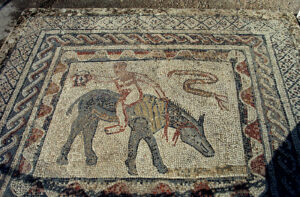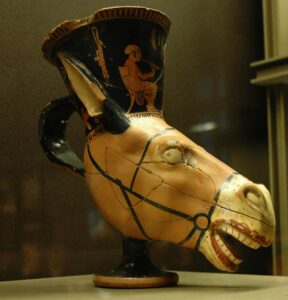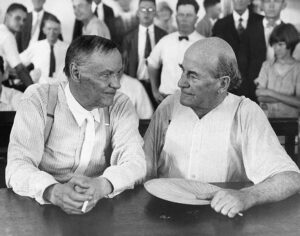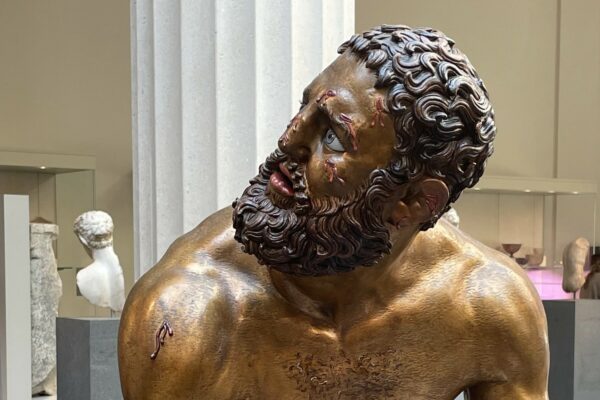
If you had “group struggles to get a fat old drunk on an upset donkey while a naked baby hovers nearby and someone serves appetizers” on your ancient art bingo card, congratulations.
Episode 39: In which Demeter stands up for domesticated donkeys, and Artemis stands up for inconsistent divine attention spans.
This episode of Real Housewives of Mt. Olympus brought to you by the latest archaeological news on SmithsonianMagazine.com – and by CLAS-B 314 The Environment in the Ancient World.
ARTEMIS, GODDESS OF THE WILDS: Demeter! We need to talk.
DEMETER, GODDESS OF AGRICULTURE: Is this about the donkeys?
ARTEMIS: You need to…wait, what? No. What about donkeys?
DEMETER: The mortals have been studying them. Remember how you got so bent out of shape when they determined when chickens were domesticated? You accused me of actively trying to undermine your authority by tricking wildfowl into becoming lunchmeat.
ARTEMIS: That makes perfect sense.
DEMETER: It really does not. Now the mortals have done the same trick with donkeys. Turns out humans domesticated donkeys from wild asses about 7,000 years ago in East Africa.

Sometimes it’s better Instagram wasn’t around to document all human achievements.
ARTEMIS: Oh. Have you seen what humans are doing in the Amazon? We need to…
DEMETER: Hold up. You verbally attack me over chickens and dogs but donkeys get no reaction?
ARTEMIS: Why would I care about donkeys? Wild asses aren’t interesting at all.
DEMETER: I thought you championed all wild animals.
ARTEMIS: No, just the appealing ones. Hephaestus might be interested in asses, he’s boring and works a lot. Didn’t he ride one into Mt. Olympus one time*?

Ladies.
DEMETER: Hold on. Donkeys are amazing animals. They are super strong, amazingly steady, and generally pretty intelligent. They’ve arguably been more important to human development than horses. Plus they’re better in hot environments, which is where the climate is heading these days.
ARTEMIS: Oh right, Thetis was telling me about that, how you’re baking the earth to steal all her underwater mortal sites. Which brings me back to the Amazon burning…
DEMETER: I am not baking the earth. Or burning the Amazon. The mortals are doing that, not me.
ARTEMIS: Wait a second…are you heating up the earth so your precious donkeys take over the world?
DEMETER: No. Just no. Again, if anyone is breeding world-dominating donkeys, it’s the mortals. The Romans crossed European and African donkeys to create a super breed. It was nearly 10 inches taller than the original donkeys.

You’d think this would be the most terrifying donkey-related nightmare fuel to come from the ancient world. You’d be wrong.
ARTEMIS: Man, Romans are intense. Only they could come up with the idea of giant Frankendonkeys, and then successfully execute that idea. Maybe they’re the ones burning the Amazon. I’ll look into it.
DEMETER: I’m pretty sure the ancient Romans are not actively burning forests in South America. Do you even understand how mortal history works?
ARTEMIS: Again, why would I care about that? Cause and effect and intention are all things that weak divinities let get in their way of smiting people. Speaking of, I’ve wasted enough time here. I’m going to go turn someone into a tree in the rain forest so they can be burnt alive by their own fire.
DEMETER: You and your brother really have a thing for anthropomorphic trees, don’t you?
ARTEMIS: (gritting teeth) Not even vaguely the same thing. I’ll change the mortal into a monkey anyway. Mortals really seem to hate that.

Clarence Darrow (left), a famous Chicago lawyer, informs William Jennings Bryan (right), defender of Fundamentalism, that the monkey bet was fixed.
Share on Twitter, or Instagram, or really wherever you want.
To learn more about how the ancients interacted with the natural world around them, enroll in our new 1-credit “appetizer” course CLAS-B 314 The Environment in the Ancient World, coming in the second-third of Spring 2023 with no pre-reqs. Or to learn more about how Romans always went big and never went home, enroll in CLAS-C 102 Ancient Roman Culture, also coming up Spring 2023, and earn GEC credits while you’re at it! Can’t get enough of Ancient Greece and Rome? Earn a Classics Minor in just 15 credits!
*As an iconographic specialist, the author of this post wishes to stress that she realizes the pictured coin most likely shows Silenus, rather than Hephaestus, as indicated by the upheld kylix and lack of other defining attribute. However, if you want to step to her on this in an academic argument, she will assert that the iconography of Hephaestus is underdeveloped and most likely related to Silenus imagery within the particular context of “bearded man rides donkey and looks ridiculous” motif. But really, she just thought the combination of image and caption were too funny to pass up, and let’s face it, not even Hephaestus’ mother cared that much about him. When was the last time he smote anyone, anyway?


